By Yiğit Saner, reporting from Rome / Italy
These are the last years of the Cold War. Italy is preparing for a new phase of capitalism in anticipation of a profound political, institutional, social and cultural change determined by many cross factors following the fall of the Berlin Wall in 1989.
The 1992 elections show that a turning point is underway. The voters’ request is clear: a renewal of the political class. And soon after comes a strong push to wipe out the parties born after the Second World War: the Milanese judges, including the famous Antonio di Pietro, triggered a definitive crisis with the investigation that took the name of Mani Pulite (Clean Hands, also known as Tangentopoli). Thus people discover a vast and profound corruption in the Italian political environment.
But that’s not all. There are other episodes such as the assassination of judge Giovanni Falcone (Capaci bombing) and his colleague Paolo Borsellino (Via D’Amelio bombing). Two great men endowed with courage that seemed to know the secrets of the mafia better than any other…
A great tragedy in the history of Italy, which still remains obscure today.
But don’t be sad, these darkest days will end soon. A self-made man will arrive to drive away the rainy clouds and bring joy to the country…
He will start his way as an entertainer who sings, dances, turns around the tables on cruise ships and in clubs, he is seventeen years old at the time but he will soon become a cavaliere and gradually a billionaire.
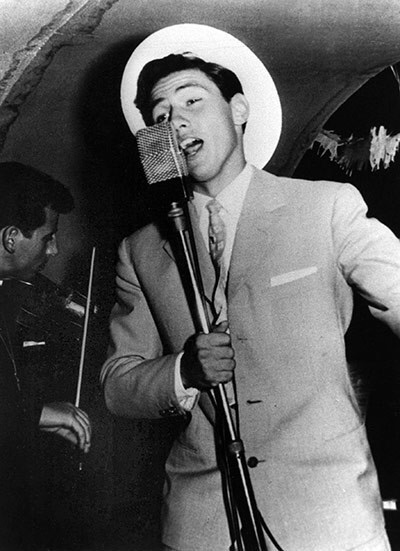
And so an era closes and a new one opens. This will be the story of Silvio Berlusconi, the man who tried to represent himself as the most Italian of all Italians.
If something doesn’t appear on TV, it doesn’t exist
We are at the beginning of the 70s. The young Berlusconi does business as a builder, designs and builds large housing complexes in Milan (Milano2 and Milano3). They are the first bricks on which he will build his fortune. “Where does all that money come from” (1) to make projects of a certain size? A mystery. This is one of the questions that magistrates, journalists and cinematographers have tried to answer during the 30 years of the Cavaliere’s political life (he was appointed Cavaliere in 1977).
In March 1976, the Constitutional Court issues a historic sentence, which authorizes the transmissions of private broadcasters, provided that they are of a local nature. The same year, Berlusconi does not miss the opportunity and founds Telemilano (it will become Canale 5), a closed circuit television for the condominiums of Milano2. It is a real revolution if we consider that in those years Rai, the state TV, presented the only television offer. He immediately understands well in advance the importance of the image and the explosive power of television. Subsequently, he buys other television channels, strengthening his position against the monopoly of Rai. His networks broaden the range of action at the national level by bypassing the laws. In 1985, the government of Premier Benito Craxi (one of his close friends) issues a decree that allows Berlusconi’s channels to be broadcast nationwide. The ban is finally lifted. Now Cavaliere can enter the houses of all Italians legally.
Berlusconi offers a completely new type of entertainment based on making everything spectacular. It is very different from state TV, institutional and far more pedagogical. Commercial Hollywood films, Japanese animated cartoons, soap operas, American formats, entertainment and football broadcasts, television awards and many half-naked girls enter the scene.
To complete his media empire, he also makes large purchases in the books and periodicals sector and in a short time also becomes the main Italian publisher.
And so television channels, newspapers, periodicals, books work to build up the Universe of Silvio Berlusconi piece by piece.
“Italy is the country I love”
In October 1993 his life takes a particular turn that will lead him to be prime minister four times: without any political experience, but with an empire of communication behind him, he then sets up Forza Italia, a name that brings football stadiums to mind, the blue color of the movement instead makes a clear reference to the Italian national football team.
Berlusconi senses – as always – the new wind and offers himself as a leader for the orphaned voters of the big parties decapitated by the investigations of the judiciary.
And he “takes the field”. He presents himself as the new man, alien to an old and rotten system who enters politics out of public necessity: “The invincible war machine of the left was on the road to power, Tangentopoli had annihilated all the democratic and moderate parties, only the Communist Party remained. We felt compelled, at that juncture, to seek a solution” said Berlusconi years after.
He responds perfectly to the new needs posed by the extraordinary development of the world of medium and small businesses. It is therefore the expression of a new social bloc that seeks political representation and fears the left in government. Many years later he would boast of having united all the voters dissatisfied with the political events of those days: “My miracle is not so much that of having set up an alliance, but of having put together an electorate.”
26 January 1994 is a historic date; all his television channels broadcast the recording of his famous political speech that begins with “Italy is the country I love”. He speaks to the people directly from his study, an absolute novelty in Italian political communication.
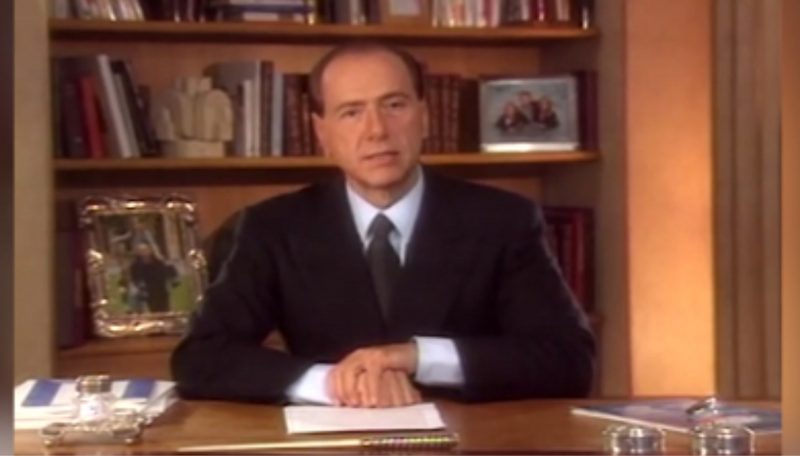
And from that moment on Berlusconi will affect the collective imagination of Italy causing an anthropological mutation. Nothing in the country’s public life will remain immune from his imprint.
“The dream of all Italians”
To get to the top in politics, he has to grab the attention of the public and involve the majority of society. To this end, Berlusconi and his organization delegitimize and overturn the schemes of the previous policy and even before the codes of communication.
There is the climate of transformation and he finds his own way to fit into it.
And then an unprecedented campaign of propaganda starts. This will be possible thanks to the predominant role of television which on the one hand changes the perception of the body and image of the political leader and on the other transmits the social values which together constitute Berlusconi’s proposal to the people: well-being, emotion, wealth, the good life. He does this by broadcasting programs on its networks that reflect the wishes and aspirations of viewers – voters.
Berlusconi’s new communication is not limited to TV activities but extends to his body, mood and look: elegant, orderly, flirtatious, fit, sporty, smiling. Without forgetting the way to dress: dark suit, light blue shirt and perfect tie.
He presents himself as closely resembling his audience as possible. He is an ordinary (starting point) “Italians are like me” and exceptional man (end point): “I am the dream of all Italians” at the same time. As a skilled salesman, he uses his abilities and the tools of seduction to successfully place his products on the market: himself and Forza Italia. He embodies the man who starts from nothing but then gains fame and power; the party instead embodies the company that will bring to the country “a new Italian miracle.”
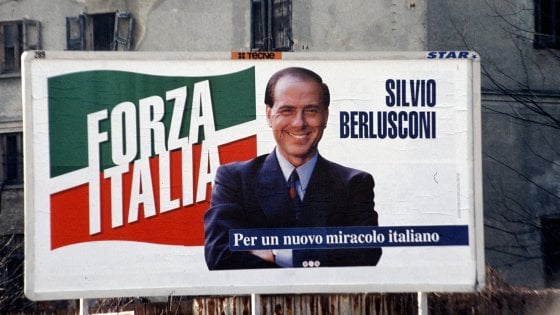
The glorification of his person, calling himself the most successful Italian man, reaches its peak in his attempt to mythologize himself: “The Pope gave me his blessing, but with the air of thinking that I had no particular need.”
He simplifies and makes his public and political speeches spectacular through the new TV using common words to address the problems of the electorates. He speaks directly to his audience, as a businessman. But we will have to wait for the 2001 electoral campaign to assist the master’s masterpiece in this direction: five days before the vote, during the “Porta a Porta” television show hosted by Bruno Vespa, Berlusconi presents and signs “the contract with the Italians.” In a format that resembles a teleshopping he negotiates his victory with the voters by promising a series of structural measures in the country and, in the event of failure to achieve at least four of the five points set out, not to stand again in the next general elections. The episode records a boom in ratings, transforming the TV studio into the place where the future of the country is at stake.
The electoral campaign rewards the image of the successful entrepreneur, perceived as extraneous to the constraints of traditional politics, capable of communicating, with simple and effective language, great development prospects for the country. The new TV helps best the themes of an anti-politics and populism that were successful results in Italian society in the years of the end of the century.
He bewitches many, and many identify themselves with him.
And so Cavaliere contradicts the predictions and in the political elections of March 1994 he wins…
A quick spin
Thanks to the immediate success he achieved with the Italians, Berlusconi soon becomes a model leader to be observed, imitated and in the same time detested and hated.
However, his government did not last long, only eight months. The executive is immediately put in difficulty by the anomalous position of the Prime Minister, a great entrepreneur and owner of the private television networks. One of the majority parties, the Lega (League), in fact decides to pull the plug on the executive also in the wake of the first judicial turmoil that will affect Berlusconi. In December, Cavaliere has to resign.
Berlusconi tries again in 2001 with the centre-right coalition Casa delle Libertà (House of Freedoms). The Berlusconi II government is born. These are the years in which European politicians begin to carefully observe the institutional and personal relationships established by Berlusconi with some of the international leaders considered “controversial” by the Western Bloc, among them Russian President Vladimir Putin, Turkish Prime Minister Recep Tayyip Erdoğan and more forward the late Muammar Gaddafi.
But among all, his legendary friendship with Vladimir Putin clearly stands out.
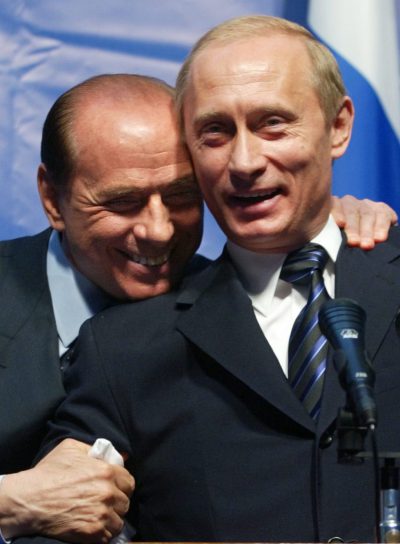
Berlusconi does not hesitate to support his friend at the expense of confronting the entire Western Bloc: “The controversial relations with Putin have also marked the current legislature and the formation of the government majority led by the leader of the Fratelli d’Italia (Brothers of Italy) Giorgia Meloni. On 18 October 2022, on the eve of the consultations for the election of the President of the Republic, the Presse news agency released an audio of Berlusconi, snatched during the assembly of Forza Italia parliamentarians in Montecitorio, in which the leader of Forza Italia claimed to have re-established relations with the Russian leader, expressing criticism of the Ukrainian president, Volodymyr Zelensky.
The issue was covered again in the media last February, with another statement in which, referring to the meeting between the Italian Prime Minister and Zelensky at the European Council on February 9, Berlusconi observed that if he had held the position of premier he would never have met the Ukrainian leader.” (2)
Following the second Berlusconi government is the third in 2005. In a year’s time in 2006 he has to resign again but he doesn’t give up, he reorganizes himself and creates the alliance of the Popolo della Liberta’ (People of Freedom). The opposition becomes an opposition contra personam. Anti-Berlusconism enters the repertoire of parties and politicians. A situation that the Cavaliere tries to make the most of: “The real Italian anomaly is not Silvio Berlusconi but the communist prosecutors and judges who have decided to attack him with countless initiatives since Berlusconi entered politics. But was Silvio Berlusconi really – he continues speaking in the third person – the most criminal businessman in the history of the world?” And he blames the “red judges” for Italy’s ills or for the difficulties of his government and accuses them of continually conspiring against him.
The fourth Berlusconi government arrives in 2008, with a coalition. This latest government experience ends in November 2011, when Italy is prey to a serious financial crisis. People begin to talk about parties, celebrations and Bunga bunga…
Good bye “Uncle Silvio”
Silvio Berlusconi’s success cannot be explained only by the fact that he possessed a media empire, but more by the political void that had opened up in the center and had to be filled in some way.
His presence on the field has had a strong impact on the other parties and candidates: Berlusconi has forced all politicians to catch up with the style and language dictated by him.
He contributed to changing the country as a protagonist, to transforming the relational dynamics between citizens and politics, causing a profound upheaval.
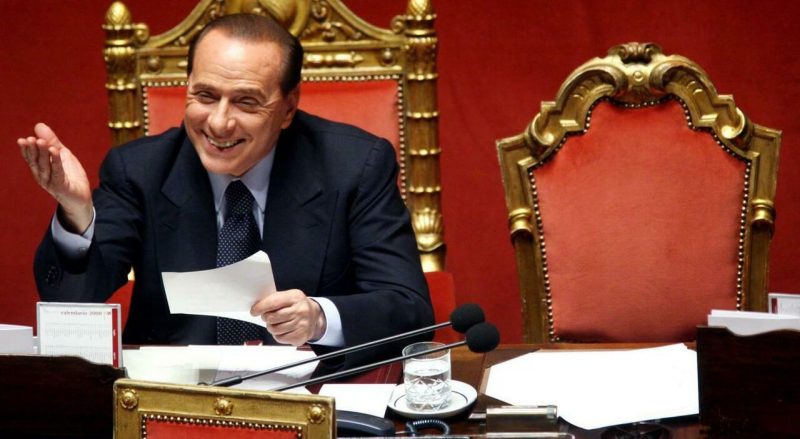
It is even difficult to imagine what Italy and the world would have been like without Berlusconi.
With these last words, I would salute the President and leave you in the hands of the Cavaliere to answer one last question…
“I make a city of four thousand inhabitants, everyone saying ‘ah it’s not possible’ – done; I make one of twelve thousand – done; I made one of eighteen thousand – done; then, when I said we will become the first publisher in Italy, Mondadori – done; A.C. Milan, it will convince, will become the first team in the world – done; the first party in government, in three months, we built a party – done. (…) Let me give you this little fact of pride: who is there in Italy who can compare his personal history in terms of successes to Mr. Berlusconi here, say so…”
The last words
Berlusconi was prime minister four times, the longest serving premier in the history of the Italian Republic.
Silvio Berlusconi took over control of the famous Italian football club A.C. Milan in 1986. During the 31 years of Berlusconi ownership Milan enjoyed unprecedented successes: 8 Serie A titles, 5 Champions League, 3 Club World Cup titles, 6 Italian Super Cups, 5 European Super Cups and 1 Italian Cup for a total of 28 trophies.
Currently against Berlusconi there are 32 concluded trials and four in progress. The alleged crimes range from corruption to false accounting, from extortion to contempt of the judiciary and up to child prostitution.
After making his debut on Forbes’ second list of the world’s billionaires in 1988, with an estimated net worth of $1 billion, Berlusconi appeared on every subsequent list until his death. Forbes estimated that Berlusconi had a net worth of $6.9 billion at the time of his death. (3)
Movies, TV series and documentaries about Silvio Berlusconi:
- Citizen Berlusconi by Andrea Cairola and Susan Gray (2003)
- Viva Zapatero by Sabina Guzzanti (2005)
- Il Caimano by Nanni Moretti (2006)
- Videocracy – Basta apparire by Erik Gandini (2009)
- Silvio Forever by Roberto Faenza and Filippo Macelloni (2011)
- Belluscone. Una storia siciliana by Franco Maresco (2014)
- My Way: Berlusconi in his own words by Antongiulio Panizzi (2015)
- 1992, 1993, 1994, TV series Sky (2015 – 2017 – 2019)
- Loro I and II by Paolo Sorrentino (2018)
Notes:
(1) A line from the film “il Caimano” (2006) by Nanni Moretti
(2) https://euractiv.it/section/capitali/news/morto-silvio-berlusconi-il-controverso-rapporto-con-lue-durante-la-lunga-carriera-politica/
(3) https://forbes.it/2023/06/12/cosi-silvio-berlusconi-ha-creato-il-suo-impero-miliardario/







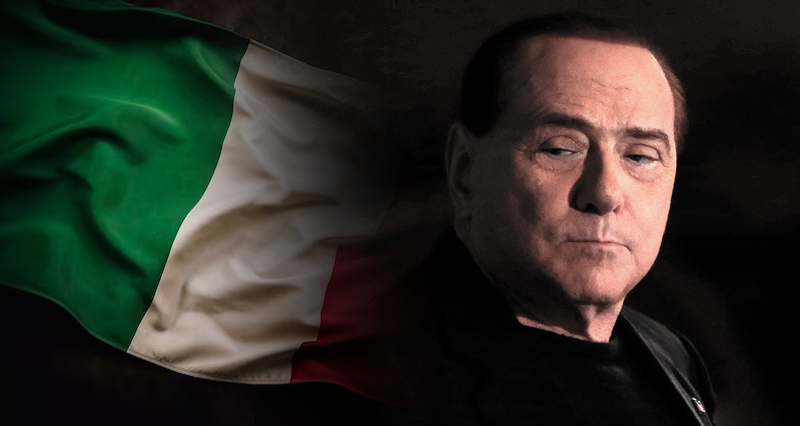








Leave a Reply